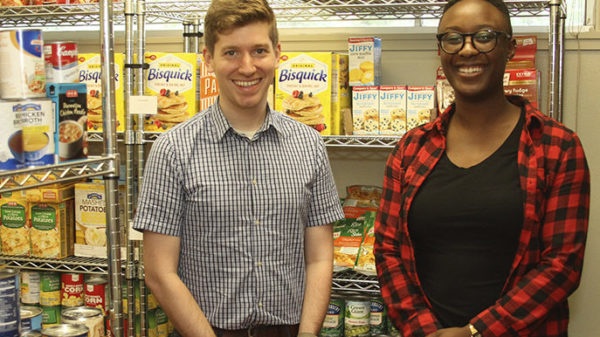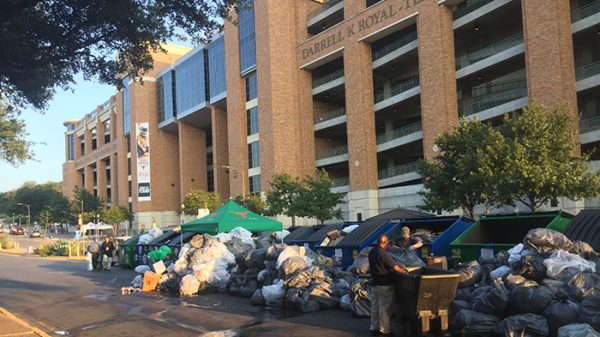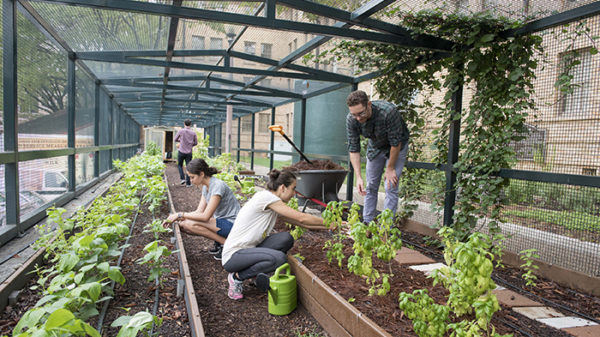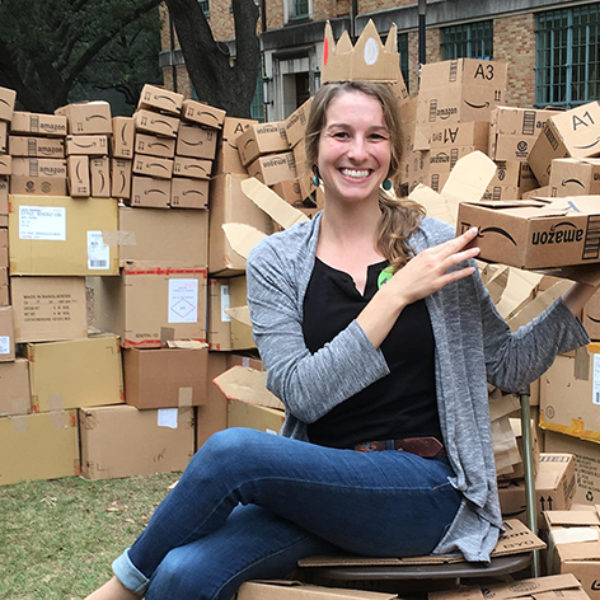In the hustle and bustle of the Forty Acres, you can find hidden gardens, racks of donated professional clothing, hearty food pantries, organized trash cans and energy-saving efforts maintained by staff and faculty members of The University of Texas at Austin — with the help of many volunteers.
Brianna Duran, Campus Environmental Center coordinator in the Office of Sustainability, says every person on campus has the potential to make a difference by contributing to larger efforts in small ways.
“What’s cool about working at UT is that you can have a big impact because there are so many of us,” Duran says. “If every staff member was conscious about that … that’s a lot of impact.”
Staff and faculty members who want to contribute have many options to give their time, energy or donations to campus programs that help power the UT Austin community.

UT Outpost
UT Outpost provides resources from the campus’s official food pantry and professional clothing closet to any currently enrolled UT student. Students can access one bag of food a month, containing on average 17 meals, and one professional outfit per semester.
Will Ross, coordinator of Student Emergency Services, says the program receives donations of food and clothing from staff and faculty members, families, community members, students, alumni and UT affiliates.
“By and large, faculty and staff have been a great supporter of our program, and they care about our students,” Ross says. “They’re here to try and help our students grow through knowledge, but they also see that there’s a need.”
According to the UT Outpost website, “between 2015-16 and 2016-17, Student Emergency Services saw a 28% increase in the number of students helped with food-related needs.” Ross says the efforts of UT Outpost’s donors, including staff and faculty members, have made a huge difference.
“If you’re faced with hunger, you’re not going to be as successful in the classroom,” Ross says. “So, this is a way faculty and staff are supporting students.”
Volunteers also can help process donations, making sure clothing is of good quality and that food meets safety standards. Ross says volunteer hours are flexible; to start the volunteer process, visit the program’s website.

Sustainability Squad
During any home football, baseball or softball game at UT, “trash can goalies” scatter throughout the stadium to ensure the proper disposal of waste. Part of the Sustainability Spirit Squad, these volunteers during the past several years have monitored cans and educated fans as they dispose of trash during games.
Anyone can be a volunteer for the Texas Athletics Sustainability Spirit Squad, including staff and faculty members. Individuals younger than 17 must be accompanied by an adult.
Adult volunteers also are needed Sundays after football games for the Sustainability Sort Squad, when waste is sorted into proper containers in a lot near the engineering building.
Texas Athletics has the first Division I collegiate baseball stadium to achieve zero waste, and the goal is to do the same at home football games during the 2020 season. Zero waste means diverting 90% of waste that would normally go to the landfill by either composting or recycling it.
“Texas Athletics continues to be a leader in pursuing the overall campus zero waste goal,” says Jim Walker, director of sustainability for UT Austin. “Beyond what you see on a game day, they collaborate with their vendors and sponsors to get everyone on board with the waste reduction and diversion efforts.”
These efforts haven’t gone unnoticed beyond campus. In May, Texas Athletics was named one of the Environmental Innovators of the Year by the Green Sports Alliance for the second year in a row.

UT Farm Stand and UT Gardens
Every other Wednesday during the fall and spring semesters, Longhorns can purchase fresh produce such as tomatoes, sweet potatoes, leafy greens and carrots from a farmers market on Speedway in front of Jester West Dormitory. UT Farm Stand, a student program that also is open to other volunteers, seeks to provide access to healthy, locally grown foods and offer education on sustainable agriculture.
Neil Kaufman, sustainability coordinator for University Housing and Dining, says the organization harvests some of the produce from UHD Gardens just before each sale date; other produce comes from local farms. The group also sets up the stand, manages displays and works with customers.
“That kind of operation requires volunteers to set up booths, sell and stylize produce and talk with customers,” Kaufman says.
The farm stand is open from 11 a.m. to 4 p.m. on sale days, and Kaufman says volunteers also are needed for planting, watering, composting and harvesting during scheduled times throughout the week at UHD Gardens, behind Jester West and in the Kinsolving Courtyard.

Longhorn Lights Out and Green Offices
As part of her role in the Office of Sustainability, Duran advises multiple student-led programs, including Longhorn Lights Out — a campuswide energy reduction effort in which staff and faculty members and students take the time to turn off all the electronics in offices and the common spaces of the university one day each month.
Just turning off the lights on the last Friday of each month saves enough energy to power a Texas home for more than a month, Duran says.
“And that’s just on one Friday,” Duran says. “If people did that every night, or they did that every workday for the whole year, that could be a lot. And not everyone participates, so there’s a lot to be saved.”
Additionally, the Green Offices program, which Duran also oversees, is designed to motivate staff and faculty members to give their time to bring sustainability efforts to their work spaces. The program offers a checklist of small steps that contribute to this effort, including labeling recycling and garbage bins to detail proper ways to dispose of waste; making sure printers are set to print double-sided as a default to reduce paper use; collecting scrap paper and sending it through UT Mail to Sanger Learning Center for students to use for studying and taking notes; and planting succulents with co-workers to have cleaner air in office spaces.



